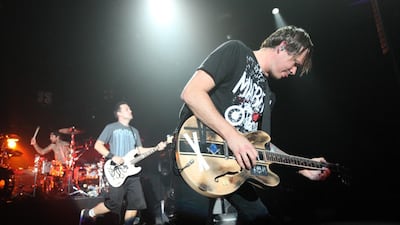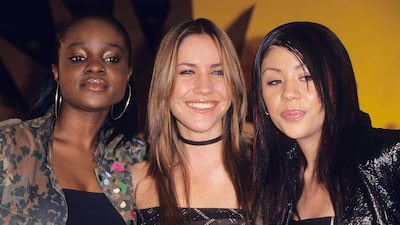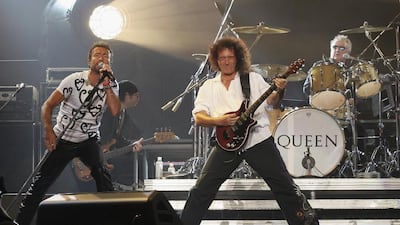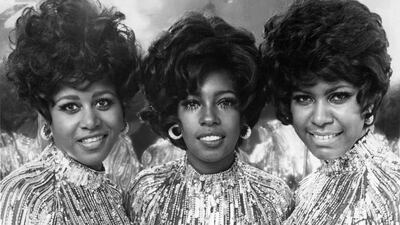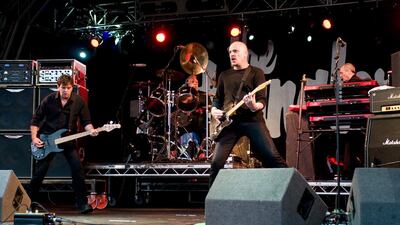When AC/DC's frontman Bon Scott died of acute alcohol poisoning in 1980, few thought the Australian band would come back stronger. But in recruiting Geordie singer Brian Johnson, they did just that. Their next album, Back in Black, was a hard-rock classic and sold more than 50 million copies. You should never write AC/DC off, then, but in recent years they've been dogged by numerous setbacks. In 2014, their stalwart rhythm guitarist, Malcolm Young, retired due to dementia, while in 2015, drummer Phil Rudd was asked to leave (he had appeared in court charged with drug possession and threatening to kill a former employee).
More recently, when the danger of permanent hearing loss forced Johnson to retire, the answer to the question posed by the title of AC/DC’s current Rock Or Bust tour looked all too clear. But then schoolboy-outfit-wearing lead guitarist Angus Young and his remaining bandmates did something surprising: they recruited Axl Rose of Guns N’ Roses to sing on their remaining European dates.
Confusion reigned and some AC/DC fans demanded ticket refunds. Wasn’t Rose committed to the newly reformed Guns N’ Roses? And how would he – a loose cannon renowned for coming on stage infuriatingly late – slot into Angus and Co’s tightly run engine room?
Thus far, Rose appears to have come up trumps. When he debuted with AC/DC in Lisbon, Portugal, recently, he brought new life and some of Scott’s old menace to AC/DC’s back catalogue – and all while seated due to a broken bone in his left foot.
AC/DC seem to have brought out the deferential fan in Rose, but with Guns N’ Roses due to resume their own tour dates on June 23, one wonders what will happen next. Will Rose make a new album with Slash and Co, or continue with AC/DC? Here are 10 other bands that replaced a lead singer.
Blink-182
Californian pop-punk pioneers Blink-182 parted ways with original frontman Tom DeLonge in 2005, but in 2008, when drummer Travis Barker survived a plane crash in South Carolina, DeLonge reached out to his former bandmate. This paved the way for a reunion tour and a new album, 2011's Neighbourhoods, but after one further EP, 2012's Dogs Eating Dogs, DeLonge and Blink-182 parted ways again, citing the re-emergence of old tensions. Blink's upcoming seventh studio album, California, out July 1, features DeLonge's replacement, former Alkaline Trio vocalist Matt Skiba. A worthy successor? We'll know soon enough.
INXS
When INXS's charismatic frontman, 37-year-old Michael Hutchence, died in 1997, his grieving bandmates downed tools for a year. Terence Trent D'Arby later guested with the group, but it was little-known New Zealand-born singer Jon Stevens who joined INXS, fronting them from 2000 to 2003. The group's unconventional last shot at replacing Hutchence came via Rock Star: INXS, a 2005 reality TV show and talent contest, which was won by Canadian J D Fortune. He joined the band and sang on their album Switch. The group later fired Fortune at Hong Kong airport. He conceded that his drug use had influenced their decision.
Sugababes
In the course of their 13-year existence, the English pop act repeatedly broke the golden rule of girl/boy groups: don't change the line-up. It was after Heidi Range replaced Siobhán Donaghy that they really hit the big time, scoring UK number 1 singles with 2002's Freak Like Me and Round Round. By 2009, Donaghy's fellow members, Mutya Buena and Keisha Buchanan, had also left the group. A different incarnation of the Sugababes soldiered on until 2011, including new singer Amelle Berrabah. The Sugababes's 2007 album, Change, was aptly named – as was 2008's Catfights and Spotlights.
Queen
Queen's Brian May and Roger Taylor have never found a suitably regal successor to the late Freddie Mercury. He was an utterly unique frontman who covered acres of stylistic ground. While current Queen singer Adam Lambert does an excellent flamboyant Freddie, he is less impressive on the rock numbers, but it was Mercury's more theatrical lead vocals that fazed former Free frontman Paul Rodgers when he sang with Queen from 2004 to 2009. "It was a big ask to expect a [macho] man with a God-given soul/blues voice to sing I Want To Break Free every night", said Taylor in 2012, flagging up Queen and Rodgers's "slightly uneasy marriage".
10,000 Maniacs
Natalie Merchant left cherished US indie act 10,000 Maniacs in 1993, but the remaining members kept it in the family. Mary Ramsey (pictured, right) had played viola and sang backing vocals on the MTV Unplugged record that was Merchant’s last album with the Maniacs and, as new lead singer, she would sing with the group at the inaugural ball for Bill Clinton’s second term as US president. In 2002, she quit the group following the death of guitarist Rob Buck, but rejoined on viola and backing vocals in 2006, performing alongside new singer Oskar Saville. Saville left in 2007, and Ramsey regained the spotlight.
Fleetwood Mac
When original frontman and revered blues guitarist Peter Green left Fleetwood Mac in 1970, suffering from drug-induced schizophrenia, it led the band to reinvent itself. After hearing Frozen Love, a track from the 1973 album Buckingham Nicks, drummer Mick Fleetwood invited Lindsey Buckingham to join Fleetwood Mac alongside bassist John McVie and singer and keyboardist Christine McVie. Buckingham insisted he and his musical partner and girlfriend, Stevie Nicks, came as a package, and Fleetwood Mac was reborn as an Anglo-American pop-rock act. Soon came 1977's Rumours, one of the biggest-selling albums of all time.
The Supremes
Every lead vocal on the dozen United States number 1 singles The Supremes scored between 1963 and 1969 was sung by Diana Ross, so in November 1969, when she went solo, fans waited to see who would succeed her in Tamla Motown’s most commercially successful act. It was 24-year-old Jean Terrell, kid sister of heavyweight boxing champion, Ernie Terrell. Motown boss Berry Gordy had heard her sing in a club in Miami Beach, Florida, and slotted her in alongside remaining Supremes Mary Wilson and Cindy Birdsong. Naturally, the Midas touch of the Ross-era Supremes proved impossible to emulate, but a string of further chart hits followed.
The Stranglers
Still garnering critical acclaim for each new album and still a formidable live act, punk-rock veterans The Stranglers parted ways with their original frontman, Hugh Cornwell, 26 years ago. Since then, not one word has passed between Cornwell and his former bandmates. John Ellis, co-founder of fellow punk act The Vibrators, fronted The Stranglers from 1990 to 2000. He was succeeded by guitarist and singer Baz Warne, who now shares lead vocal duties with the group’s bassist, Jean-Jacques Burnel. Jet Black, the band’s legendary drummer, is 77 years old and hasn’t performed with The Stranglers since 2015 due to ill health. He remains an official member, though, and is much loved by fans.
Van Halen
Some folks dubbed Van Halen "Van Hagar" when former Montrose frontman Sammy Hagar replaced singer David Lee Roth, who, for diehard VH fans, seemed indispensable. Hagar was no slouch, though, and 1986's 5150, the first album he made with Van Halen, became the group's first US number 1. Three more US number 1 albums followed before Hagar and Van Halen parted acrimoniously in 1996. Much mudslinging between guitarist Eddie Van Halen and Hagar ensued, but earlier this year the pair buried the hatchet after Hagar tweeted Eddie on his birthday. Rumours abound that Hagar will again replace Roth, who has been back with Van Halen since 2006.
The Doors
The sudden death of 27-year-old Jim Morrison in 1971 gave rise to one of the longest layoffs in rock ’n’ roll history. Only in 2002, 31 years later, did guitarist Robby Krieger and keyboardist Ray Manzarek begin performing Doors songs live again. With his rich baritone, Ian Astbury of The Cult was their new singer, and he delivered a pretty faithful Morrison impression. For legal reasons, the group had to perform as The Doors of the 21st Century – but still, original Doors drummer John Densmore sued Krieger and Manzarek for improper use of the band’s name and won. The result? No more Doors, 21st Century or otherwise. Manzarek died in 2013.
artslife@thenational.ae
